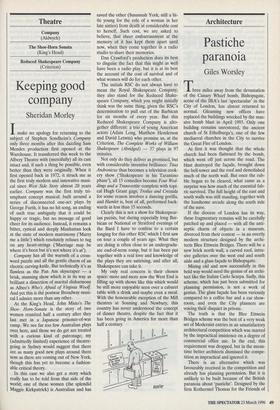Theatre
Company (Aldwych) The Shoe-Horn Sonata (King's Head) Reduced Shakespeare Company (Criterion)
Keeping good company
Sheridan Morley
Imake no apology for returning to the subject of Stephen Sondheim's Company only three months after this dazzling Sam Mendes production first opened at the Warehouse. It transferred this week to the Albery Theatre with (mercifully) all its cast intact and, if such a thing be possible, even better than they were originally. When it first opened back in 1972, it struck me as the first truly modern and innovative musi- cal since West Side Story almost 20 years earlier. Company was the first truly tri- umphant concept musical: built around a series of disconnected one-act plays by George Furth, it has no hit song, an ending of such true ambiguity that it could be happy or tragic, but no message of good cheer for its audience. Instead, it remains a bitter, cynical and deeply Manhattan look at the state of modern matrimony (`Marry me a little') which resolutely refuses to tug on any heart-strings (`Marriage may be where it's been but it's not where it's at').
Company has all the warmth of a cross- word puzzle and all the gentle charm of an electric carving-knife. But technically it's as flawless as the Pan Am skyscraper — a brisk, stunning show which is in its way as brilliant a dissection of marital disharmony as Albee's Who's Afraid of Virginia Woolf. And yet this is the postwar Broadway musi- cal I admire more than any other.
At the King's Head, John Misto's The Shoe- Horn-Sonata is the story of two women reunited half a century after they last met in a Japanese prisoner-of-war camp. We see far too few Australian plays over here, and those we do get are treated with a curious kind of patronage; my (admittedly limited) experience of theatre- going in Sydney would suggest that there are as many good new plays around there now as there are coming out of New York, though this has yet to become a fashion- able critical theory.
In this case we also get a story which really has to be told from that side of the world; one of these women (the splendid Maggie Kirkpatrick) is Australian and has saved the other (Susannah York, still a lit- tle young for the role of a woman in her late sixties) from death at considerable cost to herself. Such cost, we are asked to believe, that sheer embarrassment at the memory of it has kept them apart until now, when they come together in a radio studio to share their memories.
Dan Crawford's production does its best to disguise the fact that this might as well have been a radio play, but it is at its best the account of the cost of survival and of what women will do for each other.
The initials RSC do not always have to mean the Royal Shakespeare Company; they also stand for the Reduced Shake- speare Company, which you might initially think was the same thing, given the RSC's determination to pull out of the Barbican for six months of every year. But this Reduced Shakespeare Company is alto- gether different: a trio of young American actors (Adam Long, Matthew Henderson and David Letwin) who promise us, at the Criterion, The Complete Works of William Shakespeare (Abridged) — 37 plays in 97 minutes.
Not only do they deliver as promised, but with considerable inventive brilliance: Titus Andronicus thus becomes a television cook- ery show (`Shakespeare in his Tarantino phase'), all 15 comedies become Four Wed- dings and a Transvestite complete with topi- cal Hugh Grant gags; Troilus and Cressida for some reason involves a dancing gorilla, and Hamlet is, best of all, performed back- wards in less than 15 seconds.
Clearly this is not a show for Shakespear- ian purists, but during especially long Bar- bican or National or Stratford evenings of the Bard I have to confess to a certain longing for this other RSC which I first saw on tour a couple of years ago. What they are doing is often close to an undergradu- ate end-of-term romp, but it has been put together with a real love and knowledge of the plays they are satirising, and after all, Shakespeare can take it.
My only real concern is their chosen space: more and more now the West End is filling up with shows like this which would be still more enjoyable seen over a cabaret table with a drink and maybe even a meal. With the honourable exception of the Mill theatres at Sonning and Newbury, this country has never understood the concept of dinner theatre, despite the fact that it has been going in America for more than half a century.


































































 Previous page
Previous page